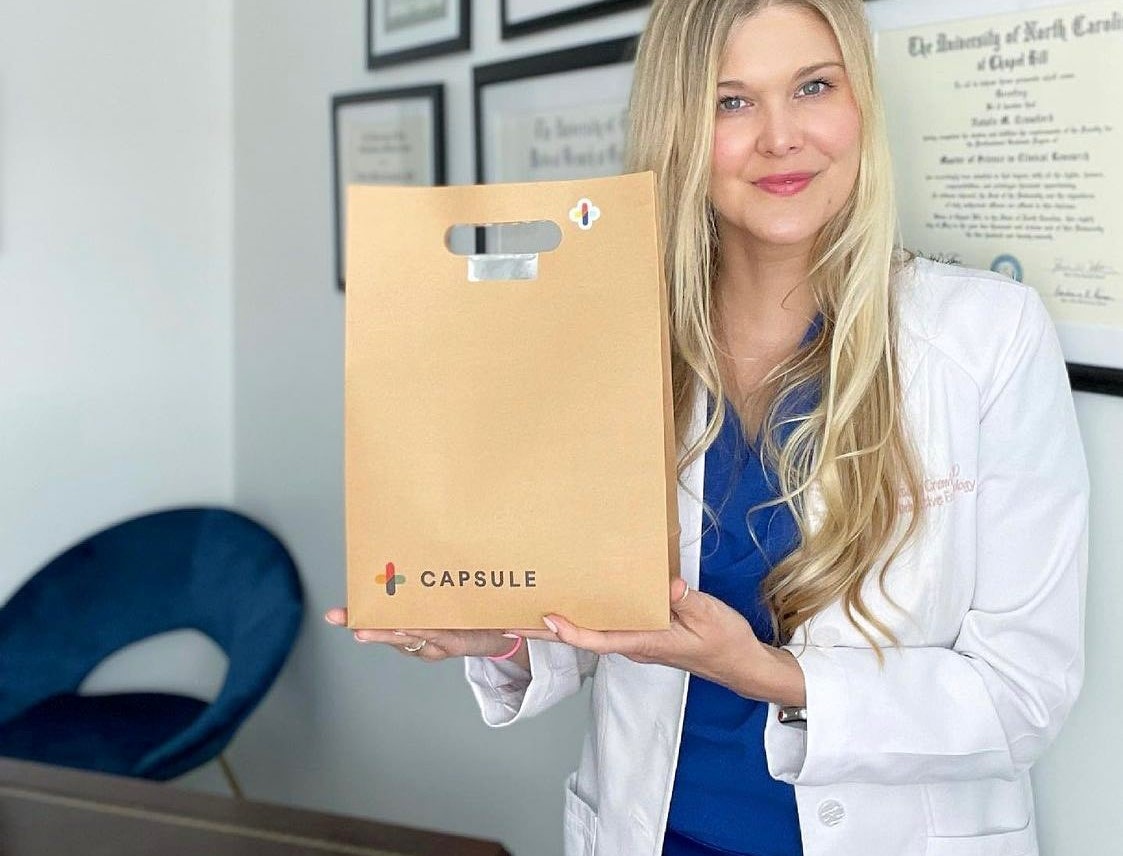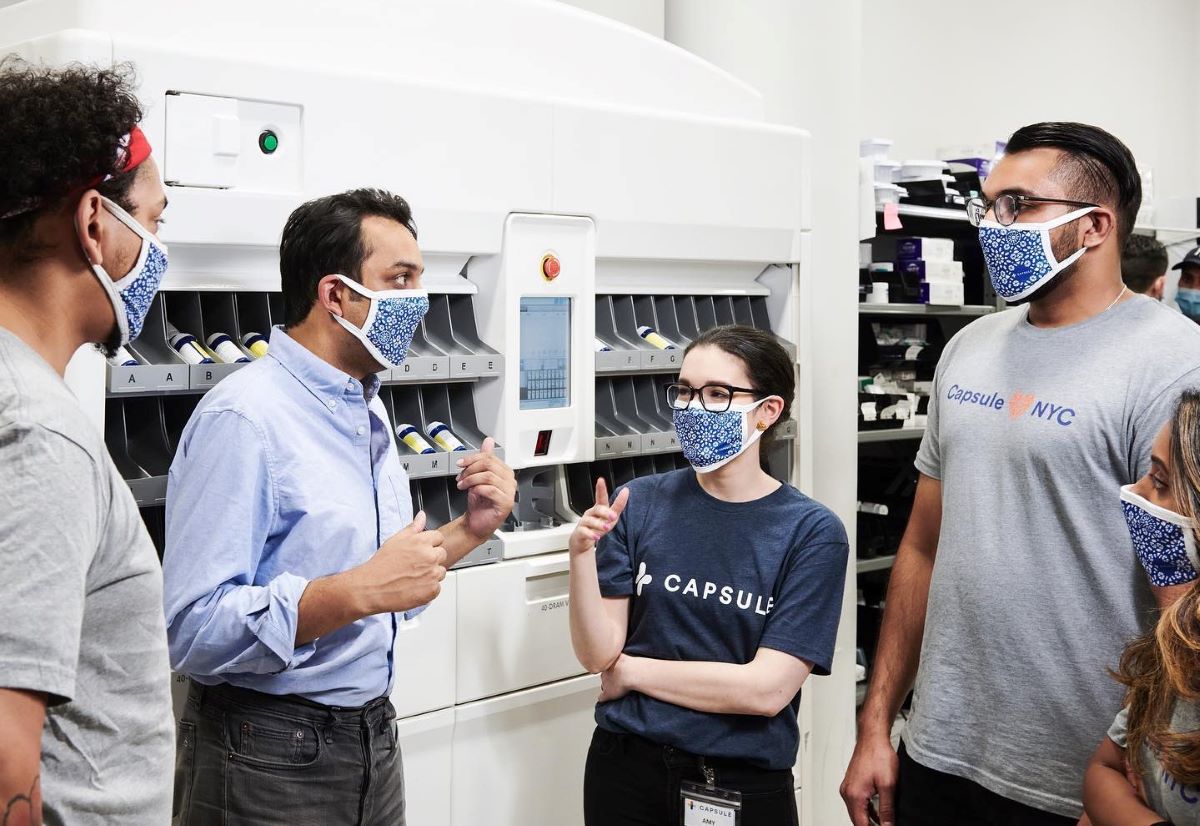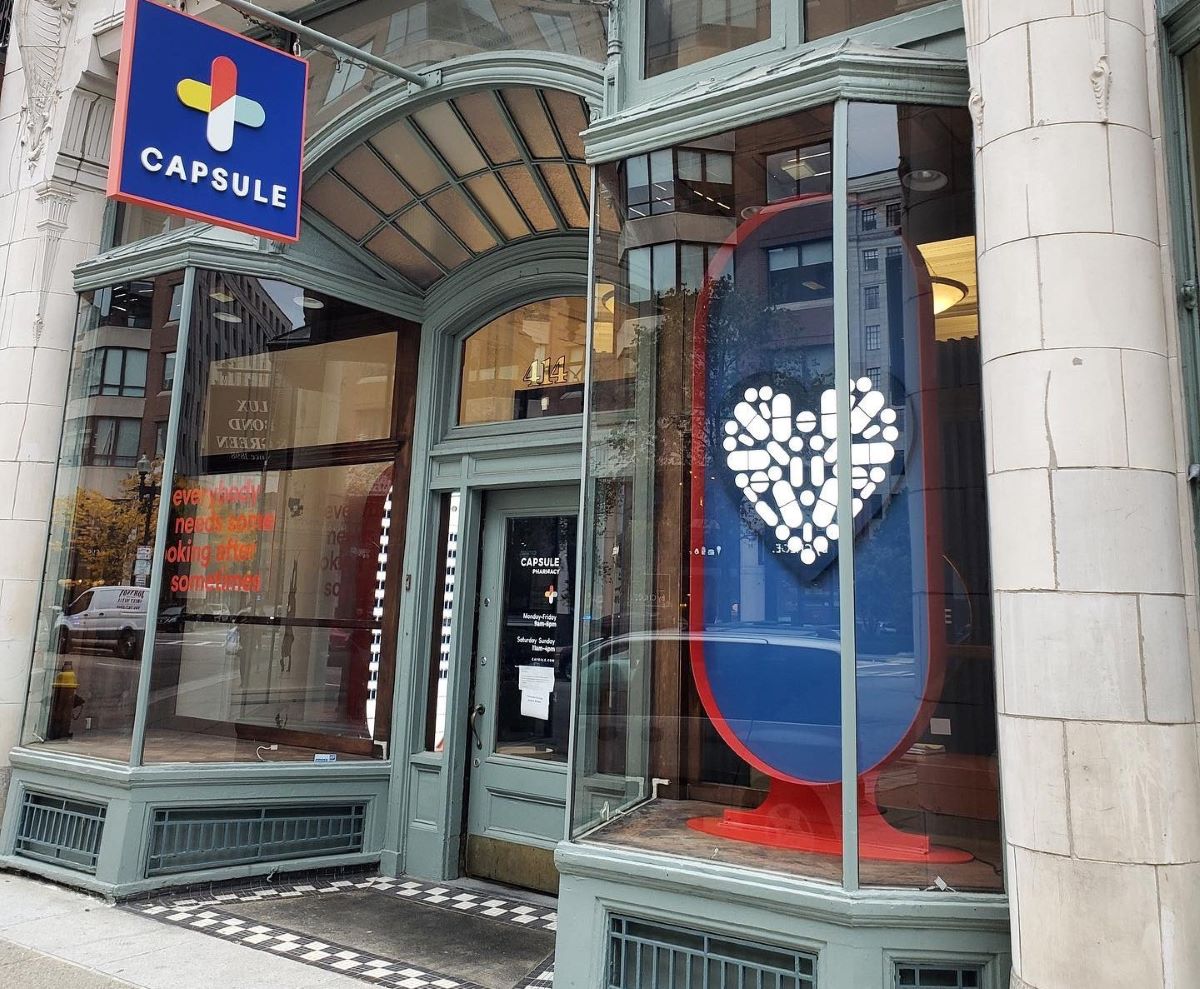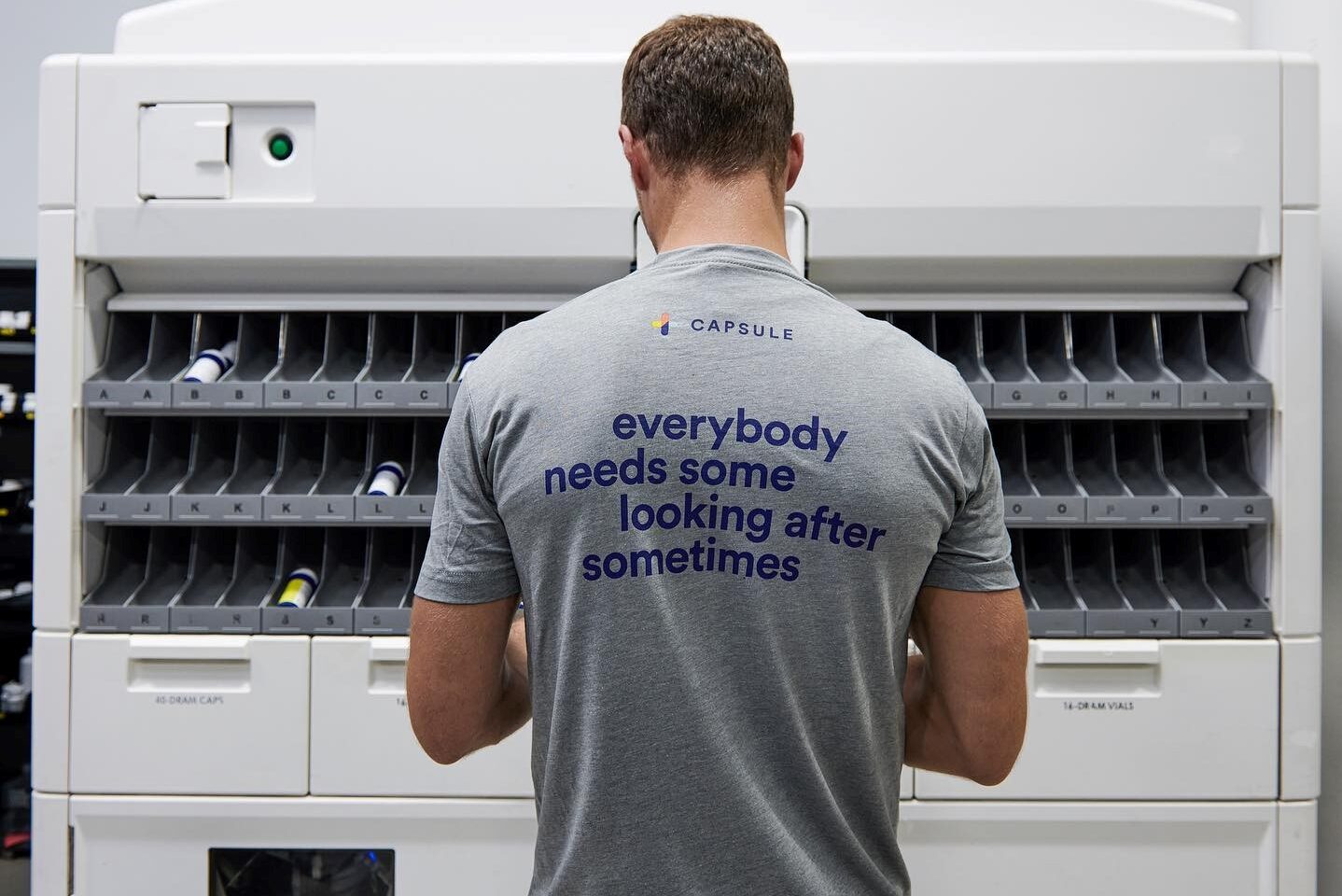Capsule: A Tech-Enabled Newcomer Raising the Bar of Interaction with Pharmacy
In 2015, former Bain Capital analyst Eric Kinariwala co-founded Capsule with the imagination of simplifying the pharmacy interaction for consumers and doctors simultaneously. Under his leadership as a CEO, the company has expanded beyond New York City to more than a dozen markets, including Austin, Chicago, Los Angeles, and Minneapolis, being known as the intersection of a technology platform, an engaging consumer brand, and the middle of the healthcare system through pharmacy.
From the very beginning, rather than invest in physical locations, Kinariwala decided to bulk up on software and hired the former head of mobile engineering at Foursquare to build a clever inventory management system that uses customer demographics, seasonal factors, doctor input, and information about commonly combined medications. And now, we’re thrilled to be sharing with you the whole inspiring success story of Capsule with some of the most valuable insights and lessons provided by Kinariwala.
What Drew a Patient to Becoming an Entrepreneur
Kinariwala spent the early part of his career as an investor, the common thread through those experiences was that he was investing in retail companies, healthcare companies, and technology businesses. As he said, that set of experiences didn’t seem to make a lot of sense when he was 25 at the time, but turned out to make perfect sense looking backward now at the intersection of what Capsule is doing.
“And I think what I’ve learned was in hindsight around being an entrepreneur. I think some of that had always been sort of in my blood, my mom is an entrepreneur herself and she’s had her own business since I was a little kid. And so I think part of that was just growing up and having seen my mom go through the ups and downs of owning her own business and then seeing the rewards of doing that but also how difficult it is,” Kinariwala added.

According to Kinariwala, one important reason to start Capsule was that he had a terrible experience with a drugstore. As he explained, “I ended up waiting in the line for an hour, I couldn’t actually find the pharmacy because it was in the basement and there were 60 people in the line ahead of me. The pharmacy was out of stock, there’s this whole series of misadventures, and so I just sort of every time viscerally understand where the pharmacy can break down for the 70% of American adults who go to the pharmacy at least once a month.”
From Kinariwala’s view, the drugstore generally hasn’t changed in 50 or 100 years. While all aspects of people’s lives are demanding frictionless emotional engagements and mobile-first experiences. The heart part is him first experiencing troubles around the pharmacy himself, and then very quickly seeing his parents, his friends’ parents and his friends really struggle with the way the pharmacy was being set up. After recounting with his friend Sonia Patel, Kinariwala started to conceptualize the idea of what a modern pharmacy should look like.
Everything seemed to crystallize for him at that moment. There seemed to be a chance to make a change in the healthcare industry and the head part is understanding the size of the market. At the time, pharmacy is the second-largest category of retail in America, it’s $350 billion and it’s only 1.5% online and aggressively moving online to offer a unique experience for the consumer.
Embrace Grit to Jump off the Ledge with Your Own Advantages
In hindsight, Kinariwala thinks the biggest thing learned is that as an entrepreneur, you have to jump off the ledge to leave what could be a stable career and a stable path, and a nice upward trajectory in whatever traditional job you have. When you’re starting out, maybe some people would tell you that it’s impossible and so you shouldn’t take a risk. To Kinariwala, it is having grit and perseverance that is most valuable among many factors an entrepreneur should have.
“I think your head and your heart have to really align to be able to have the confidence and the conviction to be able to be an entrepreneur and to start your own business. And so for me, the head part was really having spent time as an investor and really understanding the market dynamics of retailers, of consumer brands, and of where technology was changing the way consumers were interacting with all categories of things. And some of the big structural shifts in healthcare around value-based care and understanding this industry and the market dynamics around it,” said Kinariwala.
As Kinariwala said, by all accounts, starting a business from scratch in virtually any industry should fail because you are surrounded by massive companies that are resource-rich, incumbent-rich, knowledge-rich, relationship-rich, and market-position-rich. In case you have none of those advantages as a young company, Kinariwala thinks that understanding the advantages you have is critical. It may be the ability to move fast, to think about things from a different perspective, or to continuously knock down the hurdles that come in your way. What gives you the motivation to fall down seven, stand up eight, that’s the most powerful thing, Kinariwala stated.
“And then I think that has to be paired with the heart part which is, do I viscerally understand the pain point? Do I viscerally understand the consumer? Is this a problem that I can get up out of bed every day and be really excited about solving? When things get really hard, when things are different than what I thought they would be, is there a seminal moment you can go back, that’s very personal to you that you can always ground yourself in to understand the problems you’re solving. And that can be your reserve of motivation and energy,” Kinariwala added.
To Kinariwala, one of the most inspiring things about being an entrepreneur is that every day you get to feel the tangible impact you make on your customers or your constituents. There’s nothing more satisfying than being able to see a customer delighted through the service or the product or the actions you’ve taken. “I think there’s something very, very rewarding about, so to say, living and dying by your own actions and having accountability and responsibility for the things you do day in and day out,” he said.
Recreate a Considerate Mother with the Help of Technology

According to Kinariwala, the idea of Capsule and the entire experience it offers was formed based on the concept of a caring pharmacist mother, which came from the image of his own mother who would always be available and care about the condition of his health. With that in mind, Kinariwala and his team identify the goal of Capsule is to make its customers feel like they have someone right in their corner at all times so that they can freely live their best life.
“If your mom was a pharmacist and you were the only customer in the world, what would that experience look like? And that experience would look like what Capsule feels like. Your mom would make sure you’ve got the best price, she’d coordinate with your doctor, she’d make sure you knew how to take it. Of course, she’d bring it to your house, but she’d make sure on an ongoing basis that you were looked after. And that’s the key thing about Capsule.” Kinariwala explained.
To realize that initial idea, the company needs to rely on technology. It is the technology that enables pharmacists and every employee that works at Capsule to be focused on the things that humans are uniquely good at. Like many companies that have come before it, Capsule chose to use technology to facilitate better real-world experiences. That’s why we can see that more than half of Capsule’s team is made up of product and engineering talents.
While the traditional pharmacy experience consists of long waits, out-of-stock prescriptions, and lack of personal care, Capsule is now fundamentally rebuilding the pharmacy experience from the inside out with innovative technology and simple design, bringing people an experience unmatched in today’s market. “Digitizing that idea has always been the driving force of the consumer experience and the brand and what we set out to do in the early days,” said Kinariwala.
With better technology, the company would be able to provide better care, helping manage refills and copays with doctors and insurers, and make sure medication is there when needed. It works with doctors to provide adherence reports, providing insight into what is happening after the medication is prescribed. Additionally, Capsule’s predictive inventory management system means having the correct medications in stock at all times. Described by Kinariwala, Capsule’s branding is reminiscent, “of an endearing, sometimes smothering, but always loving, mother.”
Find Ways to Maintain a Feedback Loop around the Metrics
What Kinariwala has learned in the early days of doing the customer development work for the business was to repeat conversations with consumers, with physicians, with executives, and insurance companies and drug companies, and hospitals. It’s about the feedback loop around the metrics, which are the things that Capsule is tracking to know whether its initiatives are working or not.
“Whether you’re an insurance company who’s responsible for the cost of paying for medications, but you don’t have a way to engage that consumer, understand the feedback loops around if these drugs work. Are these drugs not working? Are people taking them? How do you make it easier for people on an ongoing basis to manage their medication to keep them healthier and out of the hospital? Whether you’re a drug company and you don’t have the ability to educate people about how your novel therapeutics work with any sort of meaningful channel.” said Kinariwala.

As he explained, all of those problems are in some way from the same thread which is that no one has figured out how to build a pharmacy that engages the consumer and harnesses the natural consumer engagement that exists in the pharmacy. That is something fundamentally unique that Capsule has built from scratch, from the ground up. When it comes to the key indicators that give Kinariwala conviction that he is truly on the right path, he said that what he looks at is pretty simple.
The first thing is the total number of people that are using Capsule. On a regular basis, the company tracks how its messaging and its product are resonating in the market. The second thing is consumer engagement and the Capsule measures that through retention, to find out do they keep coming back month after month after month. That brings Kinariwala to the third thing which is customer love. Not only are people using it but are they delighted to use it, are they raving about it, and are they telling their friends. “And I think the third thing is the thing that I’m most proud of about what we’ve built over the past five years,” he said.
When you go in and look at the reviews that people are leaving about the business, the way people are talking about something as prosaic as the pharmacy, it’s something really special, in Kinariwala’s opinion. What Capsule has done is that it puts the power of controlling its customers’ pharmacy experience back in their hands. So at times when they’re vulnerable, frustrated, and getting busy as there’s so much friction in managing medication. They would always have somebody who’s got their back, who’s on their team, who’s looking out for them.
Alignment Is Where Success Comes From

“The ability to continue to work with physicians, to work with large provider groups, to work with health plans, to partner with drug companies and to make all of those folks lives more successful clinically and financially is where we have been investing and where we have, ultimately, always believed the business had the most ability to be impactful on the healthcare system,” Kinariwala said.
Internally, one of the frameworks that Capsule uses consistently is around the idea that success comes from alignment. Over time, the company has really reinforced this idea that for fast and right execution to happen. Kinariwala realized that there’s really a need for the organization to be aligned at all levels.
As he said, “It’s something that I learned through a professor at business school. He was a very successful entrepreneur through his career. And it’s a pretty simple framework but everything starts at the top and everything starts at the values of the organization, and it ladders down from values to objectives to strategy, tactics, and the metrics that you measure.”
All of those things need to be in complete alignment so that folks have the context, the sheer cautiousness, and the runway to be able to execute on their own and teams feel empowered and that everyone is reading from the same sheet of music. The company’s ability is to really partner with folks and support them in their own objectives
According to Kinariwala, it happens whether it’s driving more adherence, whether it’s being able to provide more education about disease conditions or how drugs work, or whether it’s being able to create real-time data feedback loops through the technology platform. Those are all things that are places that Capsule is investing and places that in some cases already executing on.
“I don’t know if I had a healthcare-specific career advice. I’d probably have just general career advice for whatever that’s worth. One of the philosophies that I think we have tried to stay pretty true to at Capsule as we think about talent development, recruiting, how we sort of coach and develop people, is really this idea that I think people should double down on their strengths,” Kinariwala said.
Make a Technological Business the Most Human Brand
For anyone who has ever had to go to a pharmacy at any point for any reason, the value behind Capsule should be blaringly obvious. Aiming to spawn the modern pharmacy, Capsule is redefining the hegemonic standard of healthcare by making it kinder, smarter, and better. As an inherently revolutionary company, its prominence is now being attributed to its powerful and punchy brand voice. Let’s move on to learn more from Kinariwala’s thinking behind Capsule’s branding efforts and highlight the relationship between the company’s product and brand.
#1. Not Just for Millennials but for Everyone
Many people may think that Capsule is a quirky and direct brand voice that seems to attempt to appeal to the young generations and its target audience is primarily millennials. But actually, it isn’t just broken for the younger generation, it‘s broken for all of healthcare. The company designed its features to benefit everyone, but especially those who are seeking convenience due to the regular utilization of medication. Kinariwala believes that everyone deserves to be taken care of and that’s the spirit he looks to capture through the brand.
“Capsule is building a platform that works for everyone – consumers, doctors, hospitals, insurance companies, and manufacturers. We are focused on building trusted relationships with all of the people who use our service, no matter their age. Our brand voice conveys intimacy and trust from our very first interactions with you – whether you are a 25-year-old consumer or a 65-year-old physician. We have even seen some of our doctors start replying to us ‘love you’ and ‘xo’,” said Kinariwala.

#2. Play into Notions of Minimalism
Capsule’s brand also seems to play into notions of minimalism both in regards to its logo and primary copy. The company tends to utilize simplicity as a key component of the brand. According to Kinariwala, over the years healthcare technology has made enormous strides, but the pharmaceutical industry hasn’t adapted and improved at the same rate. The current model at the time was both over-complicated and impersonal.
Kinariwala has experienced a lot of frustrations firsthand and it was what inspired the original idea for Capsule. As a result, he wanted it to create a simple and seamless experience. “It would utilize innovative technology to provide people the care that they deserve and a brand that they can trust. Ultimately, we created a brand to reflect a kinder, smarter, better, and simpler pharmacy because that is what we aim to be.” he explained.
#3. Aim for a Trusted Friendly Brand
Just like the whole organization, the best brand is the brand that’s internally and externally aligned. In Kinariwala’s position, when building a brand it’s important to ask what values the team and company stand for and how that mirrors the promise you make to your customers every day. Capsule’s brand is designed to convey a level of care and trust that is rarely seen in the healthcare industry.
For Kinariwala, a brand is a proxy for trust, and healthcare is so high trust, and specifically the pharmacy, it’s something you put in your body and your kids’ body. And so it has to be high trust and people have to be able to connect with it emotionally so that they’re able to accept your suggestions around how to navigate the complexity of the healthcare system. “And I think those things require a fundamentally different way of operating and building a business than has been done in the past,” he said.
Additionally, a brand should look and feel friendly like having the right fonts for example, but that’s really a small part of your customer’s perception of your brand, as Kinariwala said. You cannot forget the human interactions. “Every interaction that we have with our customers, whether that’s in person with the messenger dropping off their medications, whether that’s how someone responds to your text message, whether that’s how someone answers your question on the phone, whether that’s what the app feels like, you should feel looked after and cared for and loved,” he added.
The Bottom Lines
By making efforts from the beginning, Kinariwala found it extremely rewarding to see Capsule team’s values come to life in a tangible way. After all, the company has been able to create an organization that speaks to all parties of the healthcare ecosystem. Usually, the things you’re good at are the things that energize you, so keep identifying what really inspires you and make a point to stay true to your vision.









